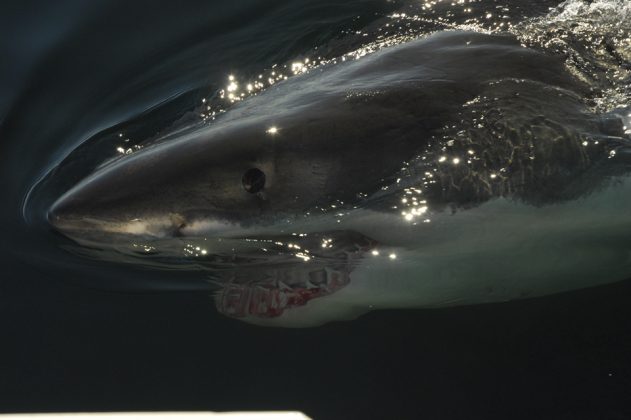With the help of an illustrious expert, Harty investigates the validity of recent Great White sightings along the UK’s south coast.
“You wouldn’t get me going in there – do you really think it’s safe?” Said a concerned walker as I strode purposefully towards the water’s edge.
A more benign day you could not imagine. Under cloudless June skies, 15 knots of tepid wind blew side-on over the waist deep Wittering lagoon. This was not sport at its most extreme.
“It’s OK,” I assured her. “I’ve done this before and I can swim.”
“No, no, no – haven’t you heard? There’s a Great White Shark out there.”
No I hadn’t heard – I’d been away … but somehow wasn’t surprised. The surest sign of summer is when the SUN or Mirror is reporting Great White shark sightings off the most popular UK holiday beaches.
Back home and uneaten, I ‘googled’ the story and sure enough, up popped the headline. Fishing journalist Graeme Pullen said he’s regularly spotted the same Great White shark off Hayling Island for the past 2 years. It’s a claim which was backed up by commercial fisherman Pete Williams from Emsworth who said a huge 12 ft. shark got caught in his nets one night and “broke through them like paper.” Mr Williams said he’s familiar with all of the UK sharks and assures us it was definitely something completely different.
Fake news?
It’s so hard to tell these days. Mr Pullen seems like a regular bloke in his interviews. However, as a professional angler, he has an incentive to play fast and loose with the facts. His profile certainly has gone through the roof since he recounted his story to the dailies. For professional and naturalistic reasons, I’ve always been fascinated by sharks. In some places such as Hawaii and Western Oz, my mind does turn to them in a slightly dark way, as I swim for my kit with a bleeding foot. But in the UK, they’re nowhere on the radar. That’s what so wonderful about our country – very few natural disasters and no beasts to poison or eat you. But why shouldn’t a Great White patrol UK waters? The nearest official sighting was off Brittany. Brittany is basically Cornwall with nicer cider. It’s caressed by the same sea. Time to investigate.
Bring in the Specialist
My good friend and sometime windsurfer, Sarah Cunliffe, owns the production company BIG WAVE TV and has made a host of award winning programs for Discovery Channel’s ‘Shark Week’. Her most recent, introduced by Ben Fogle, involved towing a dead whale (favourite shark snack) into the Irish Sea and filming the frenzy of blue sharks that turned up to feast on it.
She’s also been involved in tagging and filming Great Whites all over the world. Over a fine lunch I asked her for her opinion on the Hayling island sightings.
“I would say these reports are extremely likely to be a Porbeagle, which is a relative of the Great White and hence commonly gets mistaken for one. There was once a vigorous Porbeagle shark hunting scene off the Isle of Wight and the numbers were decimated. They’re now protected so you’d expect to see more around but they are more of a deep-water species. Not a lot is known about them, but attacks on humans are very rare – just 2 since records began.
I have to say I’m very suspicious of the press in these matters. They crave a sensation. After our blue shark encounter around the whale in the Irish Sea, the papers reported that ‘people ran screaming from the beaches.’ They did no such thing.” But the question remains – is there any reason why Great Whites shouldn’t venture into UK waters?
“There’s actually no reason why we shouldn’t have them here – and if we did it should be celebrated because big sharks are a sign of a healthy ocean. Great Whites are endothermic, which means they can raise or lower their blood temperature according to the ambient water temperature. We’re on the same latitude and have similar water temperatures to Cape Cod where the Great Whites have returned in considerable numbers.”
Following the film ‘Jaws’, which was set around New York’s Long island, there was basically a cull around the Eastern seaboard, which pretty much wiped Great Whites out. But since they were protected in the late 80s, they’ve rebounded in impressive numbers.
“For our film on Cape Cod we recorded over 200 returning sharks,” continued Sarah. “They migrate up the eastern seaboard following the food and escaping the warm water further south. They pass pretty close to shore but there haven’t been any attacks. There’s one area called Chatham which is off limits to swimmers due to the huge seal colony and, hence, dense shark population.
But I suspect there’s simply not enough food here in the Channel. Smaller than 12 ft., Great Whites eat fish, bigger than that they’re seal eaters. I could perhaps imagine them off Pembroke because there’s loads of seals.”
Happy stats
In ending Sarah was keen to point out that attacks are so rare as to not even enter your thinking (although she does advise against swimming in seal colonies). If you’re looking for reassuring statistics, the latest one is that you’re more likely to be killed take a selfie than by a shark. There’s a scientific yet slightly chilling website called ISAF – the International Shark Attack File – which records the details of every attack worldwide. You can search by country.
I’m happy to say the UK is still a blank page – even though last year surfer Rich Thomson got nipped on the thumb while out off Bantham Beach in Devon by a Smooth Hound shark (a dogfish).
Happily it was not deemed serious enough to besmirch our immaculate safety record.
If you’d like to see clips from some of Sarah’s amazing shark programs, check out: www.bigwavetv.com
Peter Hart 25th July 2017

